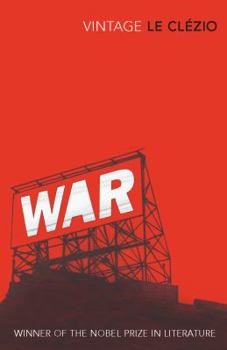War
Select Format
Select Condition 
Book Overview
War - in the mind of the fragile Bea B., in the infinite icy landscape she journeys through, in Vietnam, in 10,000 years of human history. The war of the title is not merely a war of arms but a generalised state of violence permeating every atom of Le Cl zio's creation. Bea B. searches for clues for the origin of the evil. Under her searching gaze the most everyday objects - advertisements, cars, light bulbs - reveal extraordinary dimensions, as the...
Format:Paperback
Language:English
ISBN:009953049X
ISBN13:9780099530497
Release Date:January 2008
Publisher:CCV
Length:288 Pages
Weight:0.50 lbs.
Dimensions:0.6" x 5.1" x 7.8"
Customer Reviews
1 rating
What Is To Be Done?
Published by Thriftbooks.com User , 15 years ago
Burroughs had told us this before- breathing is conspiring, consciousness is complicity. We are steeped to our eyes in blood, the atmosphere is redolent with the reek of putrefaction. Shrieks resound in the air, the ozone that we breathe is choked with hate. Raining down upon the pavement is a hail of shrapnel, landmines eagerly await their prey. We are all caught in the crosshairs, our bodies are marked for death. In this perpetual holocaust, who has time for thought, let alone literature? Few writers are quite as angry as J.M.G. Le Clezio- "War" is a maelstrom, an avalanche of a book, a relentless torrent that leaves little room for introspection or quiet contemplation. But then again, one might say that it has to be- Le Clezio is trying desperately to devise a rhetorical strategy commensurate with its task, one that is capable of keeping apace with its subject: global capital. It is true that a sense of despondency permeates the novel- "War" is unquestionably a far bleaker novel than its incendiary little cousin, "The Giants". Le Clezio, like Adorno and Beckett before him, is all-too-aware of the futility of any literary endeavor in an epoch where the human conscience has been eclipsed by unspeakable brutalities. It is foolhardy to imagine that the human being, once the pivot of the modern novel, can be retrieved from the humiliation to which he has been consigned. There is a discernibly Situationist streak that courses through "War", and Le Clezio's concerns are essentially Debord's: in a world where every image is intrinsically/inextricably bound to barbarity, where money and power have infiltrated every crevice of cultural production, can one continue to speak of autonomous art? Cue Walter Benjamin and his Theses On History: every page of European literature is saturated with gore, and the ornate treasures that clog the coffers of Western civilization bear the blemishes of murder (to make matters worse, there are those who blow the bugles for Western progress: the socialist realists and more disturbingly, Marinetti's Futurists, whom Le Clezio seems to lampoon in "War" and "The Giants"). The writer is ensnared in an impossibility: reticence is surrender, yet to speak is to inscribe oneself within a legacy of homicide. Debord's question remains crucial to all of us who aspire to create: in a society of the spectacle, deluged as it is with images, sounds and words on a daily basis, more culture is perhaps the last thing we need. The public is glutted with culture, they are constipated with it, art oozes out of every orifice. To make another film, to write another novel, to take another photograph is to fling more refuse upon this rancid heap of detritus. This was, of course, precisely the argument Georges Bataille levied against his erstwhile compatriots, Breton's surrealists- all their Trotskyist postuering amounts to just so much childish provocation as long as they continue to churn out works. It is all very well to engage in automatic





